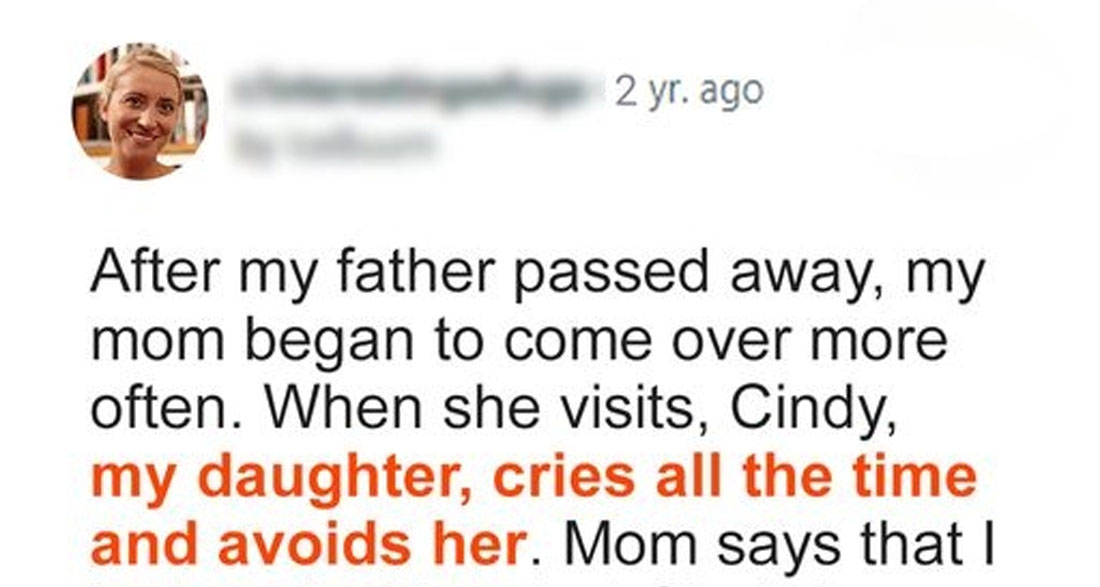When Ruby’s daughter, Cindy, began talking about her grandmother’s “friend” named William, Ruby thought it was someone she recognized. But when Cindy mentioned that this friend had the same name as Ruby’s father, who had passed away, everything changed.
Growing up, Ruby had a close-knit family. As an only child, she shared a special bond with her parents. They never missed a field hockey game or a parent-teacher meeting, always cheering her on. Even in college, they would visit every few weeks, bringing along delicious homemade meals.
But after her father passed away, everything shifted dramatically.
Now, Ruby had her own family: a loving husband named Dean and their six-year-old daughter, Cindy. Ever since Ruby’s dad died, her mother seemed like a different person. Once vibrant and full of creativity, her mom became quieter and more reserved. It was as if a light inside her had dimmed on the day they buried Ruby’s father. She started clinging to Cindy even more, trying to fill the emptiness.
Ruby’s mom often took Cindy on little adventures, and they usually had fun. But recently, Ruby noticed something concerning. When Grandma dropped Cindy off, the little girl would often cry and avoid her. This worried Ruby, but she hesitated to jump to conclusions.
One afternoon, while they were baking cupcakes together, Ruby decided to ask Cindy gently. “Sweetie, why do you cry when Grandma brings you home? Did something happen?” she inquired, mixing the batter.
Cindy paused, her expression thoughtful. “It’s because of Grandma’s friend. He’s always around.”
“What friend?” Ruby asked, surprised. “Grandma doesn’t usually have anyone with her except you.”
Cindy smiled slightly, recalling a fun memory. “But Grandma always asks me to say hello to William before we eat. Who is William, Mommy?”
That name hit Ruby like a bolt of lightning. William was her father’s name.
Staying calm, she replied, “Oh, honey, that’s okay. Let’s finish these cupcakes.” But inside, her heart raced with concern.
The next day, after leaving Cindy and Dean to enjoy a movie marathon, Ruby decided it was time to talk to her mom. She needed answers.
When Ruby brought up Cindy’s mention of William, her mother’s eyes filled with tears. “I’m sorry, Ruby,” she said softly. “I didn’t mean to scare Cindy.”
“Scare her? What’s going on, Mom?” Ruby pressed, her worry deepening.
Her mother took Ruby’s hand, her voice trembling. “I still feel your father’s presence. It started as a way to cope with the loneliness. I guess I talk about him sometimes, even in front of Cindy. I didn’t realize it would confuse or frighten her.”
Ruby’s heart ached for her mother. She had struggled with her father’s death too, but she hadn’t fully understood how deeply it had affected her mom.
“I understand that you miss him,” Ruby said gently, “but Cindy doesn’t. She’s just a child, and she doesn’t know how to make sense of this.”
They spent hours reminiscing about Ruby’s dad, sharing stories over coffee and donuts. Eventually, Ruby encouraged her mom to talk to Cindy and explain things from her perspective.
Mom agreed, realizing that while her conversations with Dad brought her comfort, they weren’t something Cindy was ready to grasp yet.
In the following weeks, Ruby’s mother opened up to Cindy about her feelings, helping her granddaughter understand that Grandpa William wasn’t a ghost or an imaginary friend—just a cherished memory. Plus, her mom began seeing a therapist to help process her grief, which made a huge difference. Her mood lifted, and she even started painting again, a hobby that she and Cindy now loved to do together.
Cindy quickly bounced back, once again enjoying her time with Grandma. As a family, they found peace and healing. Though Ruby’s mom still talked to her father, she now did it privately. They were all moving forward, together, stronger than ever.

